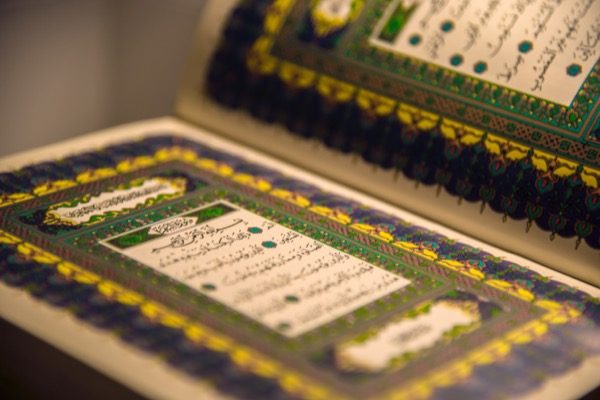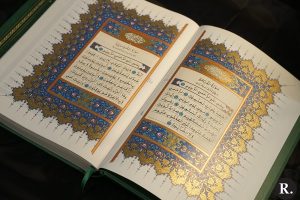
The Review of Religions is honoured to present the first ever full English translation of the commentary of Sūrah al-Falaq, Chapter 113 of the Holy Qur’an, from Hazrat Mirza Bashiruddin Mahmud Ahmad’s (ra) magnum opus, Al-Tafsīr Al-Kabīr. The first instalment of this exclusive serialisation is presented below:
سورَةُ الْفَلَقِ مَدَنِيَّةٌ وَهِيَ سِتُّ آيَاتٍ مَعَ البَسْمَلَةِ
Sūrah al-Falaq is of Medinan origin. Including bismillāh, it has six verses. (1)
(1) According to Ḥassān, ‘Aṭa’, ‘Ikrimah and Jābir this chapter was revealed in Makkah. Haḍrat Ibn ‘Abbās (ra) states that this chapter is of Medinan origin, a view also supported by Qatādah (ra)[1]. In his book, Al-Itqān, ‘Allāmah Jalāl al-Dīn al-Suyūṭī asserts the more recognised view is that this sūrah (chapter) is Medinan. Those who support this view argue that this and the following chapter were both revealed in connection to the incident in which it was claimed that the Jews had performed magic on the Holy Prophet (sa) and because of which he fell ill. Thus, at that time these two chapters were revealed and the Holy Prophet (sa) would recite them and then [symbolically] blow [over his body].
The commentators assert that since this incident occurred in Madinah, it follows that Sūrah al-Falaq and Sūrah al-Nās are Medinan.[2] In any case, precedence is given to the view that both these chapters are Medinan, albeit, this is based on the arguments opined by the commentators, and not based upon historical certainty. Although we, too, do not have concrete proof to suggest that this chapter is Makkan, nonetheless the inference by the other commentators is also weak as it is equally plausible that this chapter was revealed in Makkah, and the Holy Prophet (sa) would recite this chapter and blow over himself during his illness [in Makkah]. Therefore, it is wrong to assume that this chapter was revealed in Madinah simply due to the aforementioned incident. However, since the Holy Qur’an ends on these two chapters, we conclude that either they were revealed in both Makkah and Madinah, or that they were revealed in Madinah alone, because the revelation of the Holy Qur’an was completed in Madinah.
The account of the Holy Prophet’s (sa) illness, which was perceived by some to be the effects of the magic performed on him by the Jews, is narrated in the following words:
عَنْ عَائِشَةَ رَضِيَ اللهُ تَعَالَى عَنْهَا قَالَتْ: سُحِرَ رَسُوْلُ اللهِ ﷺ حَتَّى أَنَّهُ لَيُخَيَّلُ إِلَيْهِ أَنَّهُ فَعَلَ الشَّيْءَ وَلَمْ يَكُنْ فَعَلَهُ، حَتَّى إِذَا كَانَ ذَاتَ يَوْمٍ أَوْ ذَاتَ لَيْلَةٍ دَعَا اللهَ ثُمَّ دَعَا ثُمَّ دَعَا، قاَلَ: أَشْعَرْتُ يَا عَائِشَةُ أَنَّ اللَّهَ قَدْ أَفْتَانِي فِيْمَا اسْتَفْتَيْتُهُ فِيهِ؟ قُلْتُ: وَمَا ذَاكَ يَا رَسُوْلَ اللَّهِ؟ قَالَ جَاءَنِيْ رَجُلَانِ فَجَلَسَ أَحَدُهُمَا عِنْدَ رَأْسِيْ وَالْآخَرُ عِنْدَ رِجْلِيْ، فَقَالَ الَّذِيْ عِنْدَ رَأْسِيْ لِلَّذِيْ عِنْدَ رِجْلِيْ أَوِ الَّذِيْ عِنْدَ رِجْلِيْ لِلَّذِيْ عِنْدَ رَأْسِيْ: مَا وَجْعُ الرَّجُلِ؟ قَالَ مَطْبُوبٌ. قَالَ: مَنْ طَبَّهُ؟ قَالَ لَبِيْدُ بْنُ الْأَعْصَمِ. قَالَ: فِيْ أَيِّ شَيْءِ؟ قَالَ: فِيْ مُشْطٍ وَمُشَاطَةٍ وَجَفِّ طَلْعَةٍ ذَكَرٍ. قَالَ: فَأَيْنَ هُوَ؟ قَالَ فِي بِئْرٍ ذِيْ أَرْوَانَ. قَالَتْ: فَأَتَاهَا رَسُوْلُ اللَّهِ ﷺ فِيْ أُنَاس مِنْ أَصْحَابِهِ. ثُمَّ قاَلَ: يَا عَائِشَةُ، وَاللَّهِ لَكَأَنَّ مَاءَهَا نُقَاعَةُ الْحِنَّاءِ ولَكَأَنَّ نَخْلَهَا رُءُوْسُ الشَّيَاطِيْنِ. قَالَتْ فَقُلْتُ: يَا رَسُوْلَ اللهِ، أَفَلَا أَحْرَقْتَهُ؟ قَالَ لَا، أَمَّا أَنَا فَقَدْ عَافَانِيَ اللهُ تَعَالَى، وَكَرِهْتُ أَنْ أُثِيْرَ عَلَى النَّاسِ شَرًّا. فَأَمَرْتُ بِهَا فَدُفِنَتْ. وَهَذَانِ الْمَلَكَانِ عَلَى مَا يَدُلُّ عَلَيْهِ رِوَايَةُ ابْنُ مَرْدَوَيْهِ عَنْ طَرِيْقِ عِكْرَمَةَ عَنِ ابْنِ عَبَّاسٍ هُمَا جِبْرِيْلُ وَمِيْكَائِيْلُ-عَلَيْهِمَا السَّلَامُ- وَمِنْ حَدِيْثِهَا فِي “الدَّلَائِلِ” لِلْبَيْهَقِيِّ بَعْدَ ذِكْرِ حَدِيْثِ الْمَلَكَيْنِ: “فَلَمَّا أَصْبَحَ رَسُوْلُ اللهِ ﷺ غَدًا وَمَعَهُ أَصْحَابُهُ إِلَى الْبِئْرِ، فَدَخَلَ رَجُلٌ فَاسْتَخْرَجَ جَفَّ طَلْعَةٍ مِنْ تَحْتِ الرَّاعُوْثَةِ فَإِذَا فِيْهَا مِشْطُ رَسُوْلِ اللهِ ﷺ وَمِنْ مُشَاطَةِ رَأْسِهِ، وَإِذَا تِمْثَالٌ مِنْ شَمْعٍ، تِمْثَالُ رَسُوْلِ اللهِ ﷺ، وَإِذَا فِيْهَا إِبْرٌ مَغْرُوْزَةٌ، وَإِذَا وُتِرَ فِيْهِ إِحْدَى عَشَرَةُ عُقْدَةً. فَأَتَاهُ جِبْرِيْلُ بِالْمُعَوِّذَتَيْنِ فَقَالَ: يَا مُحَمَّدُ قُلْ أَعُوْذُ بِرَبِّ الْفَلَقِ، وَحَلَّ عُقْدَةً، مِنْ شَرِّ مَا خَلَقَ وَحَلَّ عُقْدَةً، حَتَّى فَرَغَ مِنْهُمَا وَحَلَّ الْعُقَدَ كُلَّهَا، وَجَعَلَ لَا يَنْـزِعُ إِبْرَةً إِلَّا وَجَدَ لَهَا أَلَمًا، ثُمَّ يَجِدُ بَعْدَ ذَلِكَ رَاحَةً. فَقِيْلَ: يَا رَسُوْلَ اللهِ، لَوْ قَتَلْتَ الْيَهُوْدِيَّ. قَالَ: قَدْ عَافَانِيَ اللهُ تَعَالَى، وَمَا يَرَاهُ مِنْ عَذَابِ اللهِ تَعَالَى أَشَدُّ. وَفِيْ رِوَايَةٍ: إِنَّ الَّذِيْ تَوَلَّى السِّحْرَ لَبِيْدُ بْنُ الْأَعْصَمِ وَبَنَاتُهُ، فَمَرِضَ النَّبِيُّ ﷺ، فَنَـزَلَ جِبْرِيْلُ بِالْمُعَوِّذَتَيْنِ وَأَخْبَرَهُ بِمَوْضِعِ السِّحْرِ وَبِمَنْ سَحَرَهُ وَبِمَ سَحَرَهُ. فَأَرْسَلَ ﷺ عَلِيًّا -كَرَّمَ اللهُ تَعَالَى وَجْهَهُ- وَالزُّبَيْرَ وَعَمَّارًا، فَنَـزَحُوْا مَاءَ الْبِئْرِ وَهُوَ كَنُقَاعَةِ الْحَنَاءِ، ثُمّ رَفَعُوْا رَاعُوْثَةَ الْبِئْرِ، فَأَخْرَجُوْا أَسْنَانَ الْمِشْطِ وَمَعَهَا وِتْرٌ قَدْ عُقِدَ فِيْهِ إِحْدَى عَشَرَةَ عُقْدَةً مُغَرَّزَةً بِالْإِبْرِ. فَجَاءُوْا بِهَا النَّبَيُّ ﷺ، فَجَعَلَ يَقْرَأُ الْمُعَوِّذَتَيْنِ عَلَيْهَا، فَكَانَ كُلَّمَا قَرَأَ آيَةً اِنْحَلَّتْ عُقْدَةً وَوَجَدَ عَلَيْهِ الصَّلَاةُ وَالسَّلَامُ خِفَّةً، حَتَّى انْحَلَّتْ الْعُقْدَةُ الْأَخِيْرَةُ عِنْدَ تَمَامِ السُّوْرَتَيْنِ، فَقَامَ ﷺ كَأَنَّمَا أُنْشِطَ مِنْ عِقَالٍ. الْخَبْرُ وَالرِّوَايَةُ الْأُوْلَى أَصَحُّ مِنْ هَذِهِ.
Since the commentators have given preference to Ḥaḍrat ‘Ā’ishah’s (ra) narration, hence we only present the translation of that narration:
‘Ḥaḍrat ‘Ā’ishah (ra) narrates that the Jews had performed magic on the Holy Prophet (sa), and it affected him to the degree that on occasions the Prophet (sa) thought he had carried something out when in fact he had not. One day – or during the night – the Holy Prophet (sa) supplicated before Allah Almighty, and he prayed again and again and said “O ‘Ā’ishah! Allah Almighty has bestowed upon me with everything that I have supplicated for.” Ḥaḍrat ‘Ā’ishah (ra) narrates that she enquired from the Holy Prophet (sa) “O Messenger of Allah! What did you beseech for?” He replied, “Two men came to me. One of them sat near my head, while the other sat close to my feet. The former addressed the latter, (or perhaps vice-versa) and enquired, ‘What’s the matter with him?’ (i.e. the Holy Prophet Muḥammad (sa)) The latter replied: ‘A magic spell has been cast on him.’ He then asked who had performed this magic spell on the Prophet (sa). He was told, ‘It was a Jew named Labīd bin al-A‘ṣam.’ The first one asked, ‘What was used to cast this magic?’ The other replied, ‘A comb and hair that were placed inside a cluster of dates.’ The former enquired, ‘Where are those paraphernalia?’ The latter replied ‘they are inside the well named Dhi Arwān.’
Ḥaḍrat ‘Ā’ishah (ra) says that the Holy Prophet (sa) set off to the well along with some of his Companions. He then said, “O ‘Ā’ishah! By Allah! The water of the well appeared as red as the extract of the henna [plant] (it appears that it was a custom of the Jews that when they would cast magic spells on someone, they would add [the paste of] henna plant or something similar in the water. This was to demonstrate that the water had turned red through the potency of their magic.) The dates resembled the heads of Shayāṭīn i.e. the head of snakes. (Here, the spathe of dates are likened to the head of snakes. This means that the date palms had spathes)”. Ḥaḍrat ‘Ā’ishah (ra) enquired “O Messenger of Allah (sa)! Why did you not burn the object upon which the spell was cast?” The Holy Prophet (sa) replied, “Since Allah Almighty had already cured me, I was averse to doing something which would have led to further discord. (i.e. it would have given the Jews an excuse to cause an uproar about the Muslims burning their property.) Therefore, I ordered that they be buried.” The paraphernalia were buried.’
It appears from Ḥaḍrat ‘Ā’ishah’s (ra) narration that the two men who had visited the Holy Prophet (sa) were in fact two angels. Had they been human beings, surely Ḥaḍrat ‘Ā’ishah (ra) would have seen them as well.
This narration of Ḥaḍrat ‘Ā’ishah (ra) simply means that Allah Almighty informed the Holy Prophet (sa) through the angels that the Jews had cast a magic spell on him. This does not mean that the spell they cast actually led to any effect on the Holy Prophet(sa). The fact is that when one harbours extreme hatred for another, one’s attention becomes transfixed on them. Mesmerism affects the other person much in the same way that magic does. In other words, where one tries to focus all their attention on an individual, that can also be a form of mesmerism. The Jews attempted to do the same thing to the Holy Prophet (sa). Sometimes when an adversary concentrates all their mind and thoughts on something in particular, it can have an effect on the other person in the form of mesmerism. When the Holy Prophet (sa) cast out their paraphernalia of magic [from the well] and buried them in the earth, the Jews realised that their magic spell was proven futile. Meanwhile, Allah Almighty restored the Holy Prophet (sa) to health. In short, the Jews were certain that they had cast a spell on the Holy Prophet (sa) and naturally all their mental focus was directed towards the Holy Prophet (sa) in an attempt for him to fall ill. This also had some effect on his body. However, when God Almighty disclosed the truth to the Holy Prophet (sa) and he buried the Jews’ paraphernalia, their focus diverted. Allah Almighty cured the Holy Prophet (sa).
While this narration reveals the hostility that the Jews harboured against the Holy Prophet (sa), it also demonstrates that the Prophet (sa) was a true Messenger of Allah Almighty because it was Allah Almighty Who informed the Holy Prophet (sa) about all the conspiracies hatched against him by the Jews. Thus, the fact that the Holy Prophet (sa) was informed about matters of the unseen, and that the Jews did not succeed in attaining their objective are compelling and irrefutable evidence of the truth of the Holy Prophet (sa).
Serialisation of Sūrah al-Falaq will continue in the next edition.
ENDNOTES
[1] Rūḥ al-Maʿānī.
[2] Ibid.




Add Comment